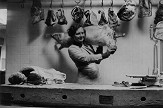|
Women at War Recruitment |
|||||||
Detailed instructions were sent out to managers and district supervisors about the engagement of new staff in each department. So successful was the recruitment drive that by the end of September 1939, managers were instructed not to make any further engagements and were congratulated not only on the number of engagements but upon their high standard. The bulletins sent out to branch managers from the joint general managers Alan and Robert Sainsbury give a fascinating picture of everyday life at Sainsbury's in wartime. Although women had been employed as clerks and grocery salespeople for many years, the pre war staff had been mainly composed of men and most managers had little experience of managing female staff. Particular care was required when dealing with relatives of existing staff: We should remind managers that, irrespective of whether they be the first hand's wife, the porter's wife, or just Miss Smith, the standard of work and conduct must be the same. However, there was a slower rate of call-up and a more gradual introduction of rationing then had been first expected, and Sainsbury's had over-estimated the number of staff needed. Also, trade in many of the branches fell, due to the evacuation of women and children to safer areas. The result was that the company's wage bill rose by £100,000 per week, at a time when sales were falling. Some women were therefore dismissed, particularly those married to Sainsbury's staff who were still working in the branches, although the company was quick to assure them that they would be the first to be called upon again if necessary. Nevertheless, the general managers considered that the recruitment drive had been a success because it meant that Sainsbury's could be confident:
That we do not run the risk of the business being severely incapacitated by losing a large number of male staff. In the long run we shall reap the very considerable advantage of a trained body of women, not a make-shift staff.
|
